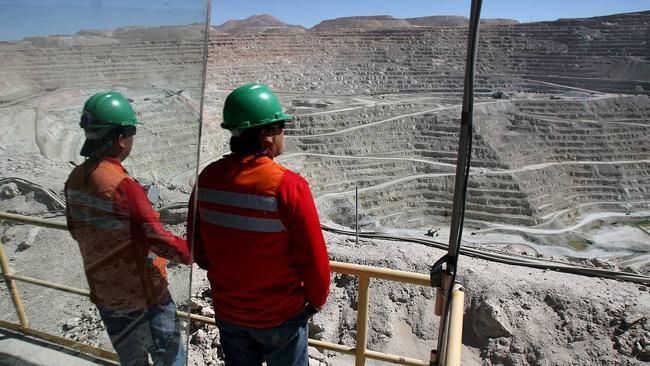BHP, Rio Tinto among miners bracing for Chile instability
BHP, Rio are among miners facing years of possible political turbulence in Chile, the world’s biggest copper producing nation.

Miners are braced for years of political instability in Chile, the world’s biggest copper-producing nation, which is holding a constitutional referendum that could lead to higher taxes.
The country is due to vote on Sunday on whether and how to replace the Pinochet-era constitution. Opinion polls predict a vote in favour of rewriting it. The vote is being held in the wake of civil unrest a year ago, the anniversary of which resulted in renewed rioting in Santiago last weekend.
The big four London-listed global mining groups - BHP, Rio Tinto, Glencore and Anglo American - all have operations in Chile, while their fellow FTSE 100 constituent Antofagasta is wholly based in the country.
Chile produces almost 30 per cent of the world’s copper, which is in higher demand with the shift to electric vehicles and green energy.
Tyler Broda, of RBC Capital Markets, said that there was “a period of instability coming” and that the poll “could increase concerns around Chile as an investment destination”.
A new constitution would be expected to promote increased welfare spending, which is likely to require higher taxes. “The whole point of (the referendum) is to have a bigger social support network, higher pensions, higher healthcare, equalising the country more,” Mr Broda said. “That’s going to cost money at some point.”
Jimena Blanco, head of Latin America research at Verisk Maplecroft, said: “Chile has been one of the most economically successful countries in the region. Yet it failed to address structural issues around the distribution of that wealth and access to quality key services for its citizens.”
Chile was “still widely recognised as the mining mecca of Latin America, especially if you’re in copper”, she said, but mining clients were looking at ways in which regulations could “cascade over the next five years”.
Chile has been hit by severe droughts and the constitution could also redefine water rights, which could feed through to rules requiring miners to build desalination plants. The companies could face higher taxes or obligations to fund and build roads and hospitals, the consultancy believes.
Mariano Machado, its senior Latin America analyst, said: “We have seen a lot of congressional representatives pushing for new ways of taxing the industry. In the long term there is no way the sector is going to escape this increasing demand. What is going to be discussed is the ‘how’ not the ‘if’.”
Mr Machado said, however, that the body elected to write the new constitution would need to agree on it by a two-thirds majority, which could lead to multiple deadlocks. He added: “The worst-case scenario for October 25 is that ‘no’ wins.”
Ivan Arriagada, chief executive of Antofagasta, said in August that he hoped the vote could provide “a way of channelling the angst around the social unrest” and that if underlying issues were addressed “that may provide more stability”.
The Times



To join the conversation, please log in. Don't have an account? Register
Join the conversation, you are commenting as Logout